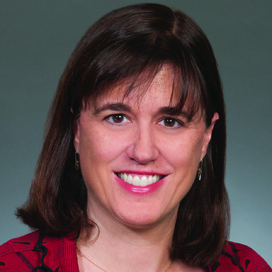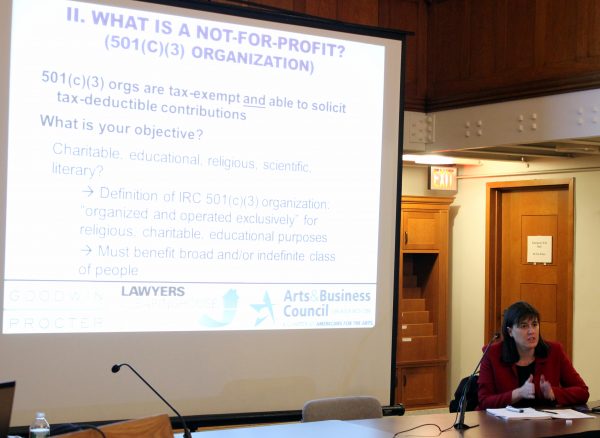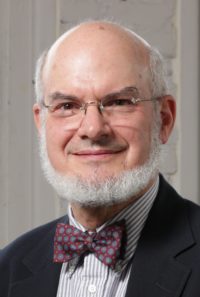 Fourteen years ago, when Lawyers Clearinghouse and Volunteer Lawyers for the Arts (VLA) teamed up to host a workshop series on nonprofit incorporation, they reached out to Sue Abbott, then an associate at Goodwin Procter, to see if she was interested in helping teach the seminars. She agreed and joined Jim Grace, the Executive Director of VLA (now part of the Arts & Business Council of Greater Boston), to lead the very first class.
Fourteen years ago, when Lawyers Clearinghouse and Volunteer Lawyers for the Arts (VLA) teamed up to host a workshop series on nonprofit incorporation, they reached out to Sue Abbott, then an associate at Goodwin Procter, to see if she was interested in helping teach the seminars. She agreed and joined Jim Grace, the Executive Director of VLA (now part of the Arts & Business Council of Greater Boston), to lead the very first class.
As the head of Goodwin’s Tax-Exempt Organization practice, Sue works closely with tax-exempt organizations, advising them on formation, compliance, and the logistics of planned donations. Her expertise made her an ideal instructor for the workshop, which was designed to provide guidance to prospective and budding nonprofits trying to navigate the complex incorporation process.
Over a decade later, more than 2000 people have attended Incorporation Workshops, and they often comment that the comprehensive and practical advice eases a lot of the stress surrounding incorporation. Sue continues to lead many of the seminars and says she still finds the process highly enjoyable.
“Each workshop is a little bit different,” she says, “and it’s always interesting to hear which organizations people are thinking about starting and to see how much creativity there is in this space.”

Sue remained instrumental in expanding the program, which now includes a section on fiscal sponsorship and other alternatives to starting a standalone organization led by nonprofit law experts from Third Sector New England. Additionally, she collaborated with the Clearinghouse to create a follow-up seminar series meant for more seasoned organizations seeking a refresher on compliance requirements and, this past Fall, co-hosted a new workshop specifically tailored to local nonprofits running programs overseas.
While the nonprofit sector continues to grow, there are still a lot of misconceptions around starting a 501(c)(3) tax-exempt organization. Sue says two of the biggest issues people face are not realizing how involved the process really is and not realizing there are other ways to make their idea a reality.
“People don’t always understand how regulated an area it is and the degree of oversight and restrictions they’ll have to comply with as a 501(c)(3),” she says. “And a lot of people are not aware of other options, whether it’s fiscal sponsorship or whether it’s working with an existing charity to start a program within that charity.”
Fortunately, Sue and Lawyers Clearinghouse have made sure to address these and other potential pitfalls, and the Clearinghouse’s more intensive Legal Referral and Legal Assessment programs enable nonprofits to work one-on-one with an attorney if issues arise.
Beyond her work at Goodwin and with the Clearinghouse, Sue counsels tax-exempt organizations on a pro bono basis. Her biggest project involved representing One Fund Boston, the nonprofit tasked with distributing funds to victims of the 2013 Boston Marathon bombing. Within days of the bombing, Sue and a team of Goodwin attorneys filed the necessary incorporation documents, working closely with the IRS to fast-track One Fund’s tax-exempt status. The team continued to provide counsel to One Fund until the charity fulfilled its duties and wound down operation in late 2015.
Sue says pro bono work is “an enormous learning experience” that benefits both experienced attorneys and lawyers who are just beginning their careers. And though her day job at Goodwin keeps her busy, she always makes time to volunteer and has no plans to stop leading Incorporation Workshops.
“Teaching the classes has been a great experience and a lot of fun over the years,” she says. “Looking back, it’s amazing to see how long it’s been going on and how much it has grown.”


